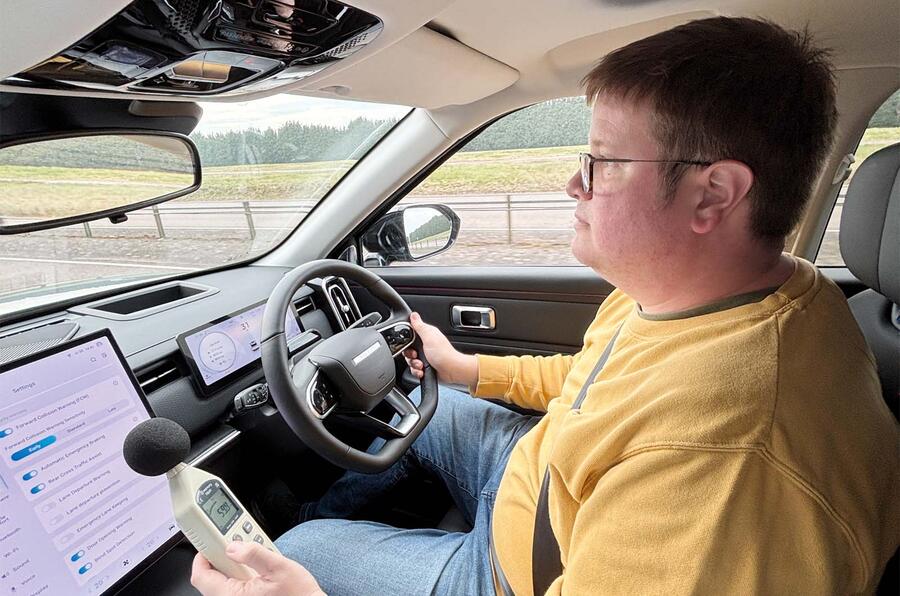Are electric cars really quieter on the road?
Our testing gear often produces some interesting results when measuring noise isolation

Opinion
4 mins read
17 April 2025
Share
I’ve done plenty of very high speeds on Horiba MIRA’s ‘twin horizontal’ straights, but rarely quite like this.
The Bentley Continental GT Speed Hybrid that I recently road tested took me to the far side of 170mph several times, back and forth in opposite directions, all within the bounds of a measured mile, while simultaneously massaging my rather spoiled and considerable posterior.
I didn’t ask it to; I just forgot to turn that particular seat function off. And, well, there can’t be many cars that could have done both.
Autocar Electric
- Amazon-backed Slate reveals bare-bones £20k EV pick-up for US
- Range Rover Electric: fresh pictures ahead of SUV’s arrival later this year
- Radical new BMW 1 Series due with EV power in 2028
- Leapmotor B10: £30k, 260-mile Ford Explorer rival driven
- Bentley Continental GT Speed review
View all electric car news, advice and reviews
The irony was that the optional massage seats weren’t in fact switched on. Instead, I was experiencing what Crewe calls ‘postural adjustment’, fitted as standard and designed to relieve the load on your backside over a long journey.
You can read all about this latest Bentley in a six-page test in a few weeks’ time. Suffice to say, for now, that the Continental GT Speed is indeed a worthy purveyor of the brand’s inimitable and characteristically enveloping, cosseting, thunderously fast and pervasively special grand touring experience.
All 2462kg and 772bhp of it, replete as the car is now with a V8-engined plug-in hybrid powertrain that should keep it relevant for years to come.
And being a PHEV capable of electric-only running at one moment and then switching to the piston-powered kind within an instant, the next thing it made me wonder was: which is actually quieter?
Isn’t the answer obvious? Ultimately, yes. But the size of the decisive margin might still surprise you. There is certainly a bit of a myth abroad that any car capable of electric running must be quieter and more refined than any that isn’t and that EVs are all whisper-quiet.
When you break out the noise meter and record what’s actually going on, the truth turns out to be a fair bit more complicated.
All of Autocar’s cabin noise testing is done on the MIRA mile straights – the same surface where our benchmark acceleration numbers are generated. So while the test conditions on the day can vary, we keep the input factors as constant as we can.
Latest Reviews

Tesla Model Y

Used Fiat Panda 2012-2024 review
8
Used Fiat Panda 2012-2024 review

Renault 5
9

BMW XM
6

Bentley Continental GT Speed
8
Read our review
Car review

Bentley Continental GT Speed
Bentley’s electrification effort finally takes in its core two-door GT coupé
Back to top
In the new Continental GT Speed, running at a steady 50mph with the engine off, the meter fluctuated around 61.7dBA – but then rose to only around 62.2dBA with the engine running.

It’s as confounding to read it again now as it was to observe it first hand, because your ears aren’t lying to you.
You can hear the instant the engine starts and easily perceive the difference it makes to the cabin’s ambient noise level, even when it’s only bumbling along just above idle – and then you look down at a meter that might as well be shrugging its shoulders and saying ‘meh’, like some uninterested adolescent.
The Continental GT Speed is a modern luxury car of particularly high standards for mechanical noise isolation, needless to say. In the average PHEV, we could probably expect a greater disparity.
Nevertheless, in any car moving along at a 50mph cruising speed, the greatest individual source of detectable cabin noise usually isn’t the engine, even when there is one fitted. Road noise and wind noise are already more prominent.
And here are some numbers to prove it. The Mercedes-Benz EQS is an exceptionally quiet car, for example, generating just 58dBA of cabin noise at 50mph, but that will have a lot more to do with the fact that it’s a £130,000 luxury Mercedes than simply an electric car.
Back to top
At the same speed, Cupra’s Tavascan EV is producing 61dBA of cabin noise – but so is the Dacia Duster Hybrid.
The BMW 120 M Sport generates a very respectable 62dBA and the new petrol Audi S5 only 63dBA, yet the Kia EV6 and Audi Q6 E-tron – electric both – each generates 65dBA.




